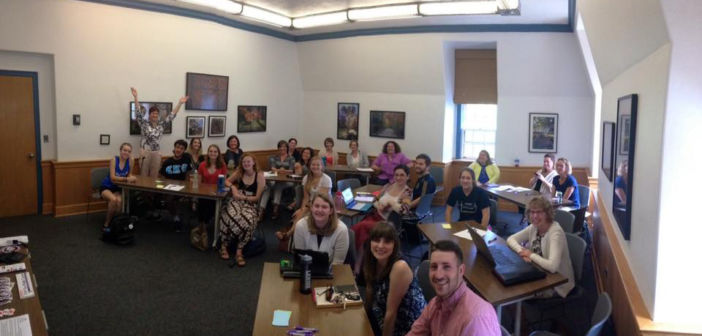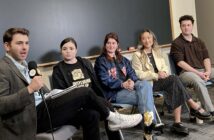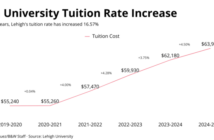To give students a baseline of knowledge of LGBTQ+ terms and concepts and prepare students to act as an ally in their daily lives at Lehigh, the Pride Center for Sexual Orientation and Gender Diversity hosted its first training session for its new program LUally on Thursday, Sept. 8.
“We hope that people walk away, not fully prepared, but with some skills to address when somebody makes a homophobic remark, or to respond in a compassionate and understanding way if someone’s questioning their gender and sexuality, and even to a certain extent, recognize when there’s systematic problems or barriers,” Pride Center director Chelsea Fullerton said.
Before this new training, Lehigh held nationally recognized training sessions, called Safe Zone, which are present at many different colleges across the country.
According to Fullerton, the nationwide Safe Zone meetings tend to be knowledge-focused, but what the students really wanted to walk away with were skills.
This past year, the Pride Center took time off from Safe Zone to critically look at what they are trying to do with its training sessions and to see what was working and what was not. Out of this process came the new training program, LUally.
Amanda Slichter, an assistant director of residence life, said that the most important aspect of LUally —continuous, personalized and skills-based training — is going to make it successful in meeting the needs of Lehigh’s students.
“Ally-ship is not a drop in, drop out, once and done thing,” Slichter said. “Everyone has a different ally-ship journey, and the more that you participate in the learning opportunities, the better ally that you’re going to be.”
LUally training sessions are not solely dedicated to learning the right terms and being up to date on the language, Slichter said, but it also focuses on learning how to interact and get real practice and experience.
Another one of LUally’s goals is to help promote ongoing learning in a tailored way.
“It’s not like I can go to one training and learn everything there is about being an ally and then I’m good and I’m set,” Fullerton said. “I have to do my work on an ongoing basis. And so LUally, rather than being one training, is a network of trainings.”
There are different skills needed for different types of people, Fullerton said, and LUally is making sure they are delivering content that makes sense depending on the audience.
This program is designed to cater to the demand on campus. There are three opportunities this year open to everyone at Lehigh, and there are also opportunities that specific groups or offices can request to have.
Everyone that goes to any event affiliated with LUally will receive a card, and as they continue to engage in activities or learning, they will receive a badge that is added to the card.
Hannah Street, ’16, said she went to the LUally program because she is interested in doing her part in making Lehigh an inclusive community for everyone.
“This program is important for Lehigh because it focuses on the importance of ongoing learning about LGBTQ+ topics,” Street said. “While it is good for everyone to attend a session and learn basics, change can really be made on campus when people attend multiple sessions and deepen their understanding about what it means to be an ally.”
LUally wants the idea of being an ally to be something active and, with the use of the badges, get people to keep attending sessions.
“It’s kind of putting your ally-ship into action, if you will,” Fullerton said. “It’s not something that you are, but it’s sort of something that you’re constantly doing.”
Slichter said LUally wants to make sure all Lehigh students, no matter their sexual orientation, have the fullest Lehigh experience with no barriers. The program is continuously working to better Lehigh’s community and create the change needed to do so.
“I think a lot of times we tend to just think of an ally as being very interpersonal,” Fullerton said. “As a kind of being that like ‘I’m going to do for my friend over here when they need it,’ but there’s other dimensions too of being an ally. It’s about being able to critique and question your own stereotypes and beliefs. I think it’s also about being able to effectively advocate for change — whether that’s something big or something small.”






Comment policy
Comments posted to The Brown and White website are reviewed by a moderator before being approved. Incendiary speech or harassing language, including comments targeted at individuals, may be deemed unacceptable and not published. Spam and other soliciting will also be declined.
The Brown and White also reserves the right to not publish entirely anonymous comments.